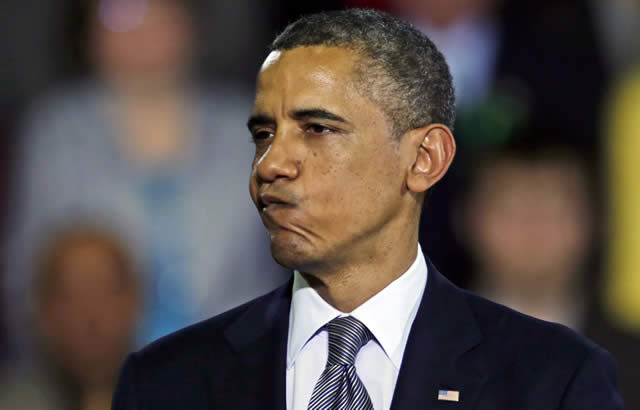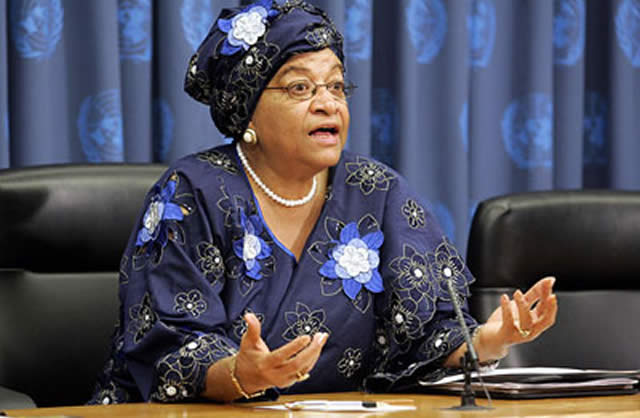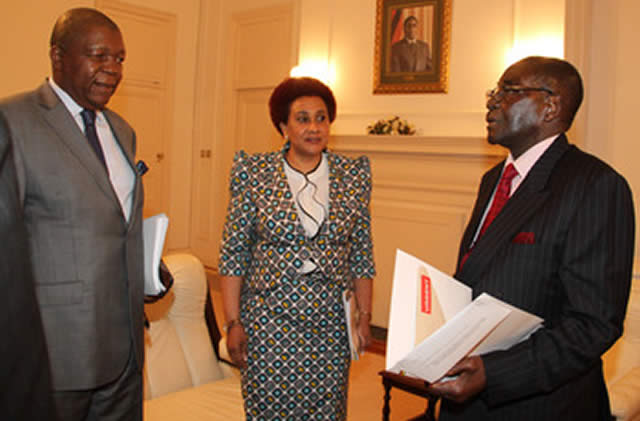Cornered Obama admits sanctions • . . . hints on refining embargo •Sanctions cost Zim US$42bn

Felex Share Herald Reporter—
United States president Mr Barack Obama was put on the spot by a Zimbabwean student at the US-Africa Business Forum in Washington, forcing him to admit for the first time that his country’s illegal economic sanctions regime was hurting ordinary people and needed to be reviewed. Mr Obama, who was speaking during an interview with 21-year-old Zimbabwean ICT entrepreneur Takunda Chingonzo at the US-Africa Business Forum in Washington, conceded that his government needed to “refine” the sanctions regime so that they do not affect businesses and ordinary people.
His admission, the first such by Washington, flies in the face of over a decade of unfounded claims that the sanctions were “smart’’ and “targeted’’ at President Mugabe and his inner circle.
In reality, however, the sanctions regime that was enabled by the signing of the Zimbabwe Democracy and Economic Recovery Bill into law by Obama’s successor, George W Bush in December 2001; cut off Zimbabwe’s lines of credit from all multilateral lending institutions with dealings with the US.
But Mr Obama said the US was in a quandary to balance the sanctions to ensure that they did not hurt ordinary people.
“Well, obviously, the situation in Zimbabwe is somewhat unique,” he said.
“Let us see if we can refine them (sanctions) further based on what you are talking about.”
“The challenge for us in the United States has been how do we balance to help the people of Zimbabwe with what has frankly been a repeated violation of basic democratic practices and human rights inside of Zimbabwe, but you are absolutely right it also has to be balanced with making sure that whatever structure we put in place with respect to sanctions do not end up punishing the very people inside those countries.”
Mr Obama then suggested a meeting with young Zimbabwean businesspeople to discuss the issue further.
“So, what I suggest would be that we set up a meeting what kinds of things the young entrepreneurs in Zimbabwe want to do and see if there are ways that we can work with you consistently with the strong message we send about good governance in Zimbabwe,” he said.
Chingonzo, a National University of Science and Technology student and co-founder of SaiSai Wireless, told Mr Obama that the sanctions were hampering efforts by ordinary Zimbabweans to conduct business with other countries.
The forum was part of the ongoing US-Africa Summit and was attended by representatives from 200 corporations and 50 African countries.
Chingonzo asked Mr Obama to clarify the embargo, saying he personally had difficulties, together with other companies, in engaging US companies because of the embargo.
He said potential investors repeatedly told them that it was impossible to do business with Zimbabweans while the sanctions were in place.
Apart from cutting off Zimbabwe’s lines of credit, ZIDERA also bids Americans working for the multilateral lending institutions to vote against any assistance to Zimbabwe in addition to imposing punitive sanctions on American companies that opt to do business with Zimbabwe.
Several companies have had their funds intercepted by the US State Department’s Office of Foreign Assets Control as part of the operationalisation of the sanctions regime.
OFAC administers and enforces economic and trade sanctions.
The Industrial Development Corporation lost over US$20 millionm, while its subsidiary Zimbabwe Fertiliser Company still has US$5 million frozen by OFAC because of the sanction law.
IDC’s US$40 000 subscriptions to the Southern African Development Community Development Finance Sector was also withdrawn due to the sanctions.
The Minerals Marketing Corporation of Zimbabwe lost over US$30 million in revenue, while Olivine, a consumer goods company, had US$2 million loan from PTA Bank intercepted by the same office.
An ordinary Zimbabwean resident in Botswana also had his US$1 000 frozen by OFAC.
The illegal sanctions regime imposed by the US and its allies is estimated to have cost Zimbabwe over US$42billion in lost revenue since the turn of the millennium.









Comments